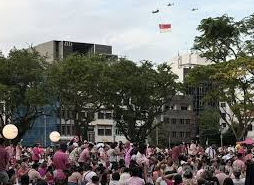How the PPP Leader’s Rhetoric Shapes Singapore’s Political Landscape
With the General Election 2025 approaching, political narratives aimed at dividing Singaporeans are already taking shape. A key figure in this trend is Goh Meng Seng, leader of the People’s Power Party (PPP), who recently declared that his “mission” in Nee Soon GRC had been accomplished.
His campaign initially revolved around challenging what he referred to as an “LGBTQ agenda.” This stance emerged after LGBTQ activist and lawyer Deryne Sim was seen on a community walkabout with People’s Action Party (PAP) MP K Shanmugam, sparking speculation about her candidacy. While neither PAP nor Shanmugam confirmed her nomination, Goh interpreted this as a significant enough issue to contest the constituency.
However, in a Facebook Live session, Goh claimed that PAP was now unlikely to field Sim, prompting him to step aside and allow opposition party Red Dot United (RDU) to contest instead. “I think my mission is accomplished,” he stated, suggesting that his campaign had influenced PAP’s decisions.
This raises critical questions about the kind of political discourse shaping Singapore. Goh’s rhetoric mirrors far-right movements abroad, framing politics around perceived ideological threats rather than policy solutions.
A Shift in Focus
Assistant Professor Elvin Ong from the National University of Singapore (NUS) pointed out the irony of Goh’s campaign. In past elections, opposition parties, including PPP, focused on economic and social issues. Now, however, the conversation has shifted towards cultural debates reminiscent of political trends in the United States and Europe.
This shift raises concerns about the broader impact of Goh’s messaging. While he claims to stand for “pro-family values,” his definition appears to exclude non-traditional families. At the same time, his opposition to diversity, equity, and inclusion (DEI) policies aligns with narratives popular among right-wing groups internationally.
Dr Felix Tan, a lecturer at Nanyang Technological University (NTU), argues that Goh’s approach lacks clear political direction. “He doesn’t seem to know what he and his party stand for,” Dr Tan remarked. “These are populist statements, but will they win him votes? That remains uncertain.”
The Real Issues at Hand
Beyond the ideological framing, Goh’s focus on LGBTQ issues overshadows more pressing concerns facing Singaporeans. Rising living costs, economic stability, and housing affordability remain key worries for many voters. Yet, rather than addressing these challenges, Goh’s campaign appears fixated on an individual’s perceived associations.
As Dr Tan points out, discussions on Singapore’s future should prioritise economic resilience and inclusivity. “If leaders—whether from the ruling party or the opposition—truly want to build a stronger Singapore, the focus must be on real solutions, not divisive narratives.”
Ultimately, voters must decide what kind of leadership they want for Singapore: one that fosters unity and addresses tangible concerns, or one that thrives on cultural divisions.








